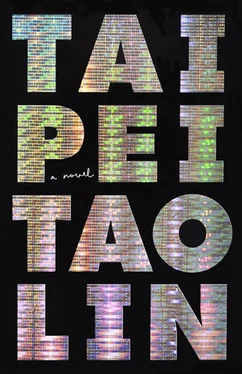Shivering, he walked with increasing speed toward the juice bar, wanting to stop moving in a way that he’d disappear, which didn’t seem possible. He ingested two capsules of MDMA with a green smoothie, then walked four blocks to a café where he was interviewed by a small, balding, frequently laughing man of indiscernible age for around forty-five minutes, during which Paul smiled uncontrollably, with almost continuously unfocused eyes, unable to discern stillness in the single image of everything, containing him in a sphere of blurrily passing scenery. He felt low in his seat, warming his hands on a cup of tea, and was sometimes aware that his face was arbitrarily pointing in strange directions, as if to consider his thoughts, or the interviewer’s questions, from various perspectives, probably seeming genuinely eccentric or weirdly, insanely pretentious. His teeth chattered and his upper body sometimes “convulsed,” he thought with brief interest, on the walk to the Drawn & Quarterly bookstore, where he sat absently in the audience in the back row with a slouched posture and, with a sensation of entering his body in medias res, at a moment when a decision, approved without his input, was about to actualize, said “is David Foster Wallace really big in America?” at a speaking volume to no one, it seemed.
Five or six people, ahead of him, facing the stage, which he also faced, shifted a little in their seats but didn’t turn around. Paul realized he’d said “America” not “Canada” and, in his state of near immunity from shame and/or anxiety, acknowledged a theoretical embarrassment, which someone not on MDMA, in his situation, might experience. For one or two seconds, with tepid disappointment toward himself, before moving nearer to the stage, Paul dimly believed people had ignored him because they knew he was on drugs and were afraid he might say more things that would humiliate and further expose himself, in a completely non-funny way, as pathetic and troubling and drug-addled and sad. After the reading, then a Q&A — during which someone asked if Paul felt like his life had changed the past few years and he said no, which he qualified by saying it had, then after a pause said he honestly felt unable to answer accurately — the owner of Drawn & Quarterly approached and thanked Paul for coming to Montreal. Paul pitched a children’s book, to be illustrated by a known graphic novelist who’d confirmed interest, based on one of his poems—
when i was five i went
fishing with my family
when i was five
i went fishing with my family
my dad caught a turtle
my mom caught a snapper
my brother caught a crab
i caught a whale
that night we ate crab
the next night we ate turtle
the next night we ate snapper
the next night we ate whale
the next night we ate whale
the next night we ate whale
the next night we ate whale
the next night we ate whale
the next night we ate whale
— with each line on its own page and the last line repeated as many times as needed. Maybe a different artist could illustrate each page to create a sort of anthology. As a children’s book, due to the content, it would appeal to college students and teenagers and be a popular gift choice. It could become “one of those things,” said Paul, who considered, at one point, while talking, if his behavior might be a little tactless and easily concluded it might be to “normal people” but not the owner of Drawn & Quarterly, which had published many books, among Paul’s favorites, sympathetic to socially dysfunctional characters.
When Paul finished talking, the owner, who’d sustained a polite, slightly tense smile and a tired and unblinking gaze, said “thank you” and walked away.
Paul’s main feeling, an hour and a half later, in a café with six to eight strangers, staring at his hands wrapped tightly around his teacup, was an excruciating combination of social anxiety and, as the MDMA stopped working, disintegrating functioning, including tremulous fingers and what felt like an inability to control or predict the volume and pitch of his voice and a helpless sensation that his face — especially if he tried to mollify its severe appearance, which he would need to do if anyone asked him a question — might begin quivering or flinching uncontrollably. His memory of what he now viewed as a “major, egregious faux pas,” his interaction with Drawn & Quarterly’s owner, was vague and nonlinear and dominated by a troubling suspicion that, with his pitch of a book in a genre Drawn & Quarterly didn’t publish, he’d interrupted the owner’s initial greeting.
Hiding in the bathroom, Paul remembered that, when he processed the identity of the owner, approaching from maybe six feet away, he’d felt a sensation not unlike clicking “send” for a finished draft of a long email, setting off his children’s book pitch. He probably had referenced his poem as if it were common knowledge because he didn’t know how he could have conveyed its effect without reciting it in full. He remembered, or thought he remembered, seeing disappointment inside the owner’s eyes — a faint off-coloring, like a woundless scar, a millimeter behind the cornea — which had seemed sad in a manner like his life (operating his publishing company, living in the same apartment for twenty years, accumulating obligations in the bleak world of graphic novels) was a pure, omnipresent, concrete reminder, Paul vaguely imagined while standing in a stall staring at his iPhone, that he was the only entity building and embellishing and imperialistically expanding his own unhappiness.
Around midnight, after everyone in the café had gone to a concert, Paul was alone in the Drawn & Quarterly book-store’s manager’s apartment. He looked at Twitter for what felt like twenty minutes, alternating hands to hold his iPhone ten to fifteen inches above his face. He emailed Charles—
I’m lying in bed on a sofa
Feel strongly like I simply want to relate my feelings of bleakness in this email
My legs feel cold
— with “Feeling bleak” as the subject. He was looking at Twitter again, a few minutes later, when for the fifth or sixth time since getting it in August he dropped his iPhone on his face, which did not register in its expression that anything had happened until after impact. He considered emailing Charles that his iPhone fell on his face. Then he tried to do what he couldn’t specifically remember having done since college — he chose one of his favorite songs and, with a meekly earnest sympathy toward himself, listened to it on repeat at a high volume and tried to focus only on the drums, or bass guitar, until he was drowsy and decontextualized and memoryless, when he would half-unconsciously remove his earphones and turn off the music, careful not to be noticed and assimilated by the world, and disappear into the reachable mirage of sleep.
But he couldn’t focus on the music. He couldn’t ignore a feeling that he wasn’t alone — that, in the brain of the universe, where everything that happened was concurrently recorded as public and indestructible data, he was already partially with everyone else that had died. The information of his existence, the etching of which into space-time was his experience of life, was being studied by millions of entities, billions of years from now, who knew him better than he would ever know himself. They knew everything about him, even his current thoughts, in their exact vagueness, as he moved distractedly toward sleep, studying him in their equivalent of middle school “maybe,” thought some fleeting aspect of Paul’s consciousness, unaware what it was referencing.
Paul arrived in Toronto the next night on a Megabus, then rode two city buses to the apartment of a Type Books employee and his girlfriend and slept on a sofa. In Whole Foods the next day, for around five hours, he ate watermelon and looked at the internet and typed answers to an email interview. He walked to a café near Type Books and asked on one of the two threads on 4chan about him that, for some reason, had appeared the last two days — and, with two to four hundred posts each, 90 to 95 percent derogatory, were the two longest threads on him that he’d ever seen — if anyone in Toronto could sell him MDMA or mushrooms within two hours. Someone named Rodrigo, who’d recently moved here from San Francisco, Paul discerned via Facebook, emailed that he could get mushrooms and maybe MDMA but not until after Paul’s reading.
Читать дальше












